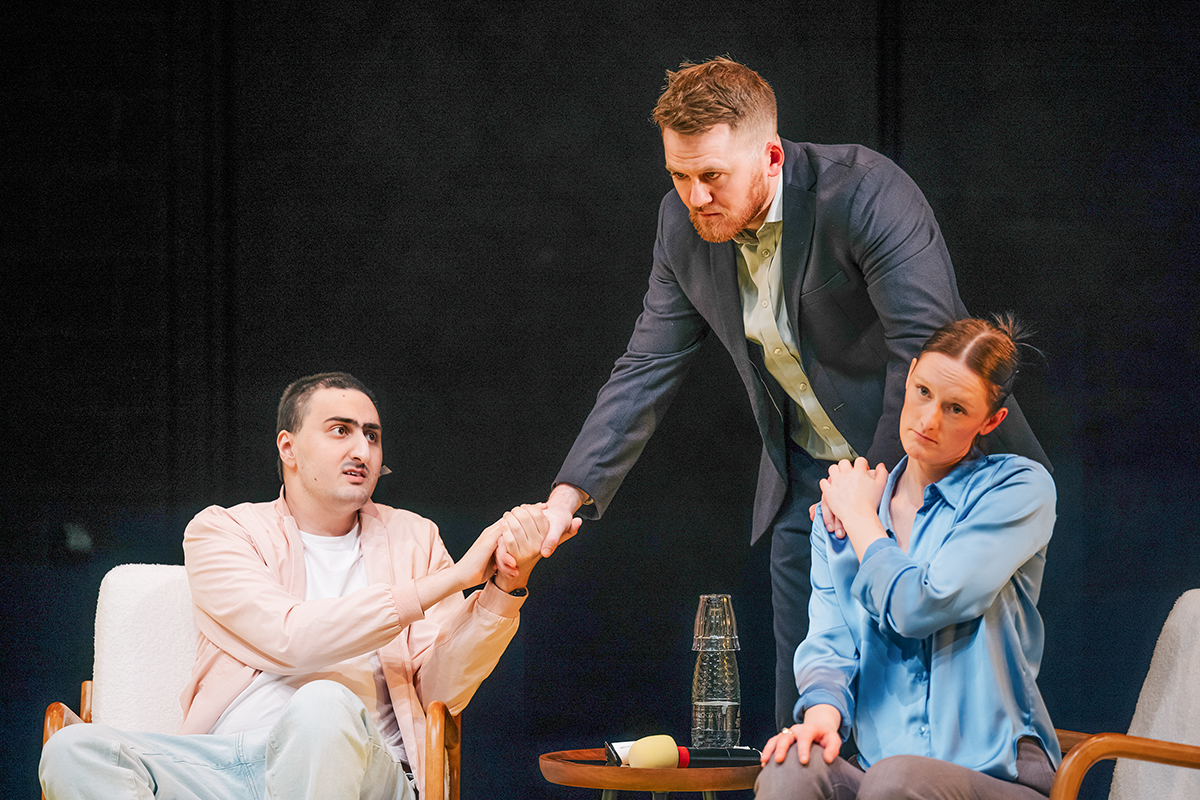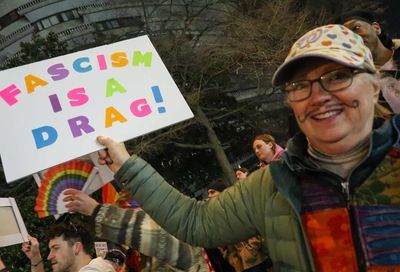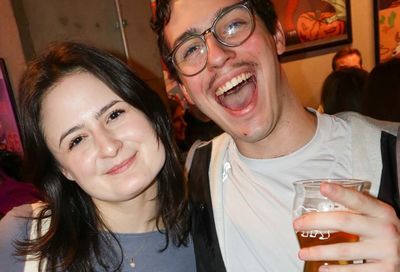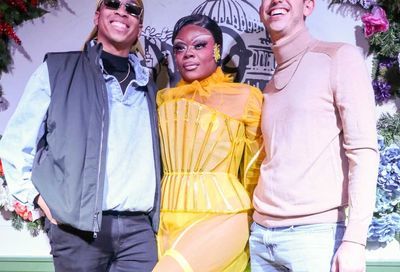Tony Curtis
The (Hot) MW Interview
 Tony Curtis |
“I’m telling you” — Tony Curtis’s Brooklyn accent is as thick and redolent and comforting as a slice of New York pizza with extra extra cheese — “getting dressed as a woman is no easy experience. You can get very intimidated by it.”
Curtis is recalling his stint in 1959’s Some Like It Hot, in which he played a musician named Joe who, along with his pal Jerry (the irrepressible Jack Lemmon), witness the St. Valentine’s Day Massacre and hide out from the mob dolled up as Josephine and Daphne, joining an all-girl big band. Critic Roger Ebert called the Billy Wilder screwball classic an “enduring treasure of the movies, a film of inspiration and meticulous craft,” and in 2000, the film took the number one spot in the American Film Institute’s blue ribbon film industry poll of the 100 Funniest American Movies. (Hot was trailed by Tootsie, another cross-dressing romp, and Stanley Kubrick’s dark and brilliant Dr. Strangelove.)
Forty-three years later, the 77-year-old actor is back in the Some Like It Hot saddle — only this time, it’s the live musical version written by Funny Girl collaborators Jule Styne and Bob Merrill. Though still spry, he’s a little too long in the tooth to reprise his screen role, so instead he’s playing off-kilter millionaire Osgood Fielding, who woos the rather “mannish” Daphne, not realizing that she is, in fact, a he.
It’s a welcome adrenaline boost to a screen legend whose career has waned somewhat. Recent film forays for Curtis have included B-grade projects as The Mummy Lives, Lobster Men From Mars, and Alien X Factor. (In this regard, he’s emulating the Halloween-based career of the daughter he sired with his first ex-wife, actress Janet Leigh.) But in his heyday, Curtis was unstoppable — one of Hollywood’s prettiest boys and most versatile leading men. He could play it all. From light and frothy (The Great Race, Norman Jewison’s 40 Pounds of Trouble) to dramatic and meaningful (The Defiant Ones, Spartacus) to dark and troubling (Sweet Smell of Success, The Boston Strangler).
|
Curtis has never shied away from controversy — or playing gay (albeit covertly gay). Spartacus is famous for a bathtub scene excised before the film’s 1960 release in which Laurence Olivier’s character comes on to Curtis’s innocent slaveboy Antoninus with the line “Some people like oysters, some people like snails. I like oysters and snails.” In 1958’s The Defiant Ones, Curtis played opposite Sydney Poitier, as two prisoners, shackled together, on the run.
That movie, says Curtis, contained a homosexual subtext. “The subject of homosexuality did not come up literally,” he says during a phone call from Dallas, where Hot: The Musical kicked off the current leg of its national tour, “but it was so evident. There have been a number of movies I’ve found myself in without even thinking about it doing it because I like the idea of the impudent attitude toward sex, politics or anything else. My film career always kind of moved in that direction.”
Despite his preference that the word gay be used in its original context — as a synonym for happy — Curtis, a self-proclaimed, life-long “womanizer” has a genial, open attitude towards gays, whom he refers to during the conversation as “my brothers and sisters.” Such warm, welcoming sentiments from a Hollywood legend show that, as Curtis himself notes, “things are indeed getting better.”
MW: A couple years ago, Some Like It Hot took the number one spot in the American Film Institute’s list of America’s 100 Funniest Movies. How did you feel when you first heard the news?
TONY CURTIS: I was so thrilled to think I ended up in a movie like that. All the comics in Hollywood hated me at that moment, that I ended up in the funniest movie ever made. Buddy Hackett, Milton Berle, all these other guys, said, “We were comics, we did the funny stuff.” But the palate of comedy is so wide that it encompasses everybody. So that made me feel good.
MW: Do you recall how you felt when you first had to dress as a woman? Did you have any qualms at the time?
CURTIS: I did. I’m telling you, getting dressed as a woman is no easy experience. At the beginning I was very shy, I wouldn’t come out of my dressing room. It took [director] Billy Wilder to coax me out. Slowly I got used to it, but I was always intimidated by it.
MW: I always thought you made a gorgeous woman in that film.
CURTIS: I did. I looked a little like Eva Gardner, Eve Arden, Grace Kelly and a little touch of my mother.
MW: How did it feel to acknowledge your feminine side?
CURTIS: I’d always felt it but had never articulated it. What made it difficult for me, as a kid, was to see how people mistreated boys who acted like girls or girls who acted like boys. I always found it to be an aversion that they would pick on someone because of an attitude toward their sex.
MW: It sounds as though you were very progressive for the time.
CURTIS: I was. There were so many wonderful people I knew and I wasn’t interested in their sexual orientation as much as I was their gentleness, their friendship, their loyalty. And those qualities come in all of us.
MW: Let me ask you about Spartacus. The highly suggestive bathtub scene between you and Laurence Olivier was originally cut from the film in 1960 and then restored when the film was re-released in 1991.
CURTIS: Yes, and [since Olivier had died], Anthony Hopkins did Olivier’s voice and I did my voice to give [the scene] a soundtrack. They didn’t even keep the soundtrack because they never planned to put the scene in the movie. I remember when we were going to shoot it, the studio said, “Well maybe we won’t.” And both Larry and I objected. We said, “We want this scene in the movie.” So they did it in one shot. No coverage. We knew there was trouble right there.
It wasn’t until the picture was released that we realized that they lost the most important part of that movie. That movie was the love story of three men — Spartacus [Kirk Douglas], Marcus Licinius Crassus [Olivier] and my character, Antoninus — not a heterosexual relationship between Spartacus and a woman, and their child who will grow up to be the future. That’s done in all the movies — everyone’s always holding up something for the future. “This will be the kid of the future.” But what about these three men? I always thought that should have been the basis for the movie. Sure, the guy fucks a girl and makes a baby, sure our freedom is being trounced on by everybody, black, white, all nationalities or religion. Yet we delicately avoid the physical love between men. We never discuss those scenes, and if we do they’re always salacious and always lewd and never really capture the real sense of what we are as people.
Stanley [Kubrick] and I were perhaps a little more progressive in our thinking than Kirk [Douglas] and all those other guys who were making the movie. Sure, let’s talk about everything but let’s not talk about homosexuality. That’s a no-no. Especially at Universal Pictures.
MW: What was it like to be a screen idol at that time?
CURTIS: Oh, I loved it. To me, it’s the finest thing that could happen to anybody. To be considered a leading man. These words don’t mean anything, but the idea of chasing women, I like that. I like being a womanizer. And I’ve had the best time any guy has ever had chasing girls. And I’ve been married five times. A lot of chasing and a lot of alimony, but that’s alright. I’ve had a good time. And at the same time, I was making interesting, diverse movies.
MW: Did it ever bother you that you may have been perceived as gay back then?
CURTIS: Yes, when I first started I felt bad about it. In the late forties and fifties, there was a whole different concept of what homosexuality was. I don’t even like to use the word gay. To me, the word gay is a description of life — to be gay is to be happy — not a synonym for sexual preference. It doesn’t do the word the service it needs.
MW: In the musical of Some Like It Hot, you’re playing the millionaire Osgood Fielding, the part played by Joe E. Brown in the movie.
CURTIS: Yes.
 Curtis with Timothy Gulan as Daphne in Some Like It Hot — The Musical. |
MW: At the end of the movie, Jack Lemmon’s Daphne finally reveals to Brown, who has been chasing Daphne throughout the film, that he is, in fact, a man. Brown is completely nonplussed by the revelation and shrugs it off with a great joke.
CURTIS: When you see us in Some Like It Hot: The Musical, you’ll be astounded at how close we come to that sexual bender section. I fall in love with his character because he’s the hairiest, coolest looking girl I’ve ever seen. He’s hard and tough and I find that very appealing. At the end there’s the same exchange as in the movie. I want to get married and his character [still in drag] goes “We can’t, I’m not a natural blonde.” I say, “That’s okay, I don’t mind.” He says, “Well I’ve been living with a saxophone player for three years.” I say, “I forgive you.” He says, “I can never have children.” I say, “We’ll adopt.” He pulls the wig off and says, “I’M A GUY!” And I look at him, put my arm on his shoulder and say, “Nobody’s perfect.” It gets the scream of the night, the biggest laugh I’ve ever heard.
So I’ve got a part where a guy falls in love with a guy. The audience and everyone around me knows that this girl is a guy except me. You think. I fall in love with this girl, and all my scenes are with this girl. My love scenes, my dancing scenes, everything I’m doing is an attempt to woo her. And I finally do. So on stage in America today there’s a guy on who’s wooing another guy dressed like a woman, and when the guy tells him he’s really a man, he says to him, “Nobody’s perfect.” It’s a fabulous moment.
MW: It was very daring moment back in 1959. The subtext of the movie can be perceived as very gay friendly, very reaffirming.
CURTIS: Right. And very controversial. But the fact that I’m in Some Like It Hot, a movie that has to do with gender-stretching and guys being mistaken as girls, is the greatest contribution I made in my film career. I say that to you from my heart.
MW: In a broader context, you were part of what is known as Hollywood’s Golden Age. Can you comment on the way you perceived gay actors as being treated back then? Rock Hudson comes to mind as an example.
CURTIS: Rock and I were the best of friends, we were always together at the studio. [Not being out] had a very profound effect on Rock. He was the most giving and gentle man I’ve ever known and wanted nothing more than to be left alone. It really disappointed him, and near the end he was very sad.
MW: It was interesting to discover during my research that you’re a painter as well. On your website, in a discussion of your art, you note that you avoid colors like brown because, for you, they don’t exist. Can you explain?
CURTIS: To me, there is no brown. One person once asked if I meant that in a racial context? I said, “I’m not talking about racial. I find that brown keeps us close to the planet. It’s home. We can’t get off of it. It grounds you.” So in all my paintings I eliminate brown and give them, perhaps, a ethereal look of infinity. And that’s the purpose of my not using brown. Take away the earth tones. What do you see? You see blue, you see white, you see stars. My portrait of Marilyn Monroe is a good example of it. All the colors around her are white, and when you see her, it captures an ethereal quality about that girl. I didn’t want her earthbound. If I need a brown or what I think is brown, I’ll mix a black and take some white and a little gray, but I don’t really like the look of brown.
MW: Do you keep in close contact with your daughter Jamie Lee Curtis?
CURTIS: Oh, yes, we talk a lot. But we don’t see much of each other.
MW: I remember seeing her in the first Halloween — the resemblance to you was palpable, especially in the eyes. She keeps coming back for round after round of those Halloween films, though.
CURTIS: That’s where the money is. You keep coming back to the craps table where you won more than you did before. That’s the nature of the profession. But it’s more than just making money, it’s being in something that’s successful that people want to see.
MW: I’d like to see her do more comedy.
CURTIS: I would, too. She is funny. Someone said to me, “Tony where does Jamie get this flair for comedy?” And I said, “Well, she doesn’t get it from her mother.”
MW: You’ve worked with so many legendary directors. Do you have a personal favorite?
CURTIS: Yes, Stanley Kubrick. He treated film like a human condition, treated it like it was space that you worked in. A lot of these directors used it like postercards. Like flat black and white photographs. They never saw it with more depth and finesse.
MW: What about Billy Wilder?
CURTIS: Billy Wilder was more in control of the material than he was the actor.
MW: Favorite co-star?
CURTIS: A whole slew of people. Cary Grant. Jack Lemmon. Gregory Peck. Marilyn Monroe.
MW: Age old question: What was Marilyn Monroe like to work with? CURTIS: She was all bummed out by the time we did Some Like It Hot. She had been through so much turmoil in her personal life and she was never that stable, so being the most popular actress of that time just kind of bent her.
|
MW: Do you look at movies today and think to yourself, "Man, we were making them better back then?"
CURTIS: The technique of making movies is better today. One can do more in special effects. But I haven’t seen any movie lately where I felt performances were as good as some of the earlier films — that period of time from the thirties, just before the war, through the mid Seventies. Those pictures carried a great sense of who we were and what we were. They captured the periods of time very nicely. With a film today, you’re really not quite sure. When you see a movie made in the late Thirties, you know it’s the late Thirties. You know it’s a theatrical piece and it has a history. It doesn’t try to bullshit you into thinking it was yesterday.
MW: How does it feel to be such an integral part of people’s memories?
CURTIS: I don’t give it much thought. But I’m so thrilled to turn on television and there I am, forty-three years ago. It’s hard for me to recount it in any way. The meaning comes after the work. While you’re doing it, you don’t really know what you’re doing. So all of these pictures, when I see them now, I see another level that I didn’t notice when I made them. That makes them very appealing to me.
MW: Is it odd to see yourself on TV forty-three years later?
CURTIS: In a way, it is. If my children watch TV, they can see me at every stage of my life. Imagine if you could watch films of your father when he was thirty-four, running around somewhere. You’d probably see a lot of yourself in him. That’s what my children see. And I enjoy looking at me. I was a handsome dude. What I know from my parents is that looking good is the best revenge — and don’t you forget it.
Tony Curtis stars in Some Like It Hot: The Musical from Tuesday, August 27 through Sunday, September 1 at Wolf Trap, 1551 Trap Road, in Vienna, Va. (Shuttle service is available at the West Falls Church Metro Station.) Tickets are $18 to $55. Call 703-218-6500 or visit www.wolftrap.org. Visit Tony Curtis’s virtual art gallery at www.tonycurtis.com.
Support Metro Weekly’s Journalism
These are challenging times for news organizations. And yet it’s crucial we stay active and provide vital resources and information to both our local readers and the world. So won’t you please take a moment and consider supporting Metro Weekly with a membership? For as little as $5 a month, you can help ensure Metro Weekly magazine and MetroWeekly.com remain free, viable resources as we provide the best, most diverse, culturally-resonant LGBTQ coverage in both the D.C. region and around the world. Memberships come with exclusive perks and discounts, your own personal digital delivery of each week’s magazine (and an archive), access to our Member's Lounge when it launches this fall, and exclusive members-only items like Metro Weekly Membership Mugs and Tote Bags! Check out all our membership levels here and please join us today!
























